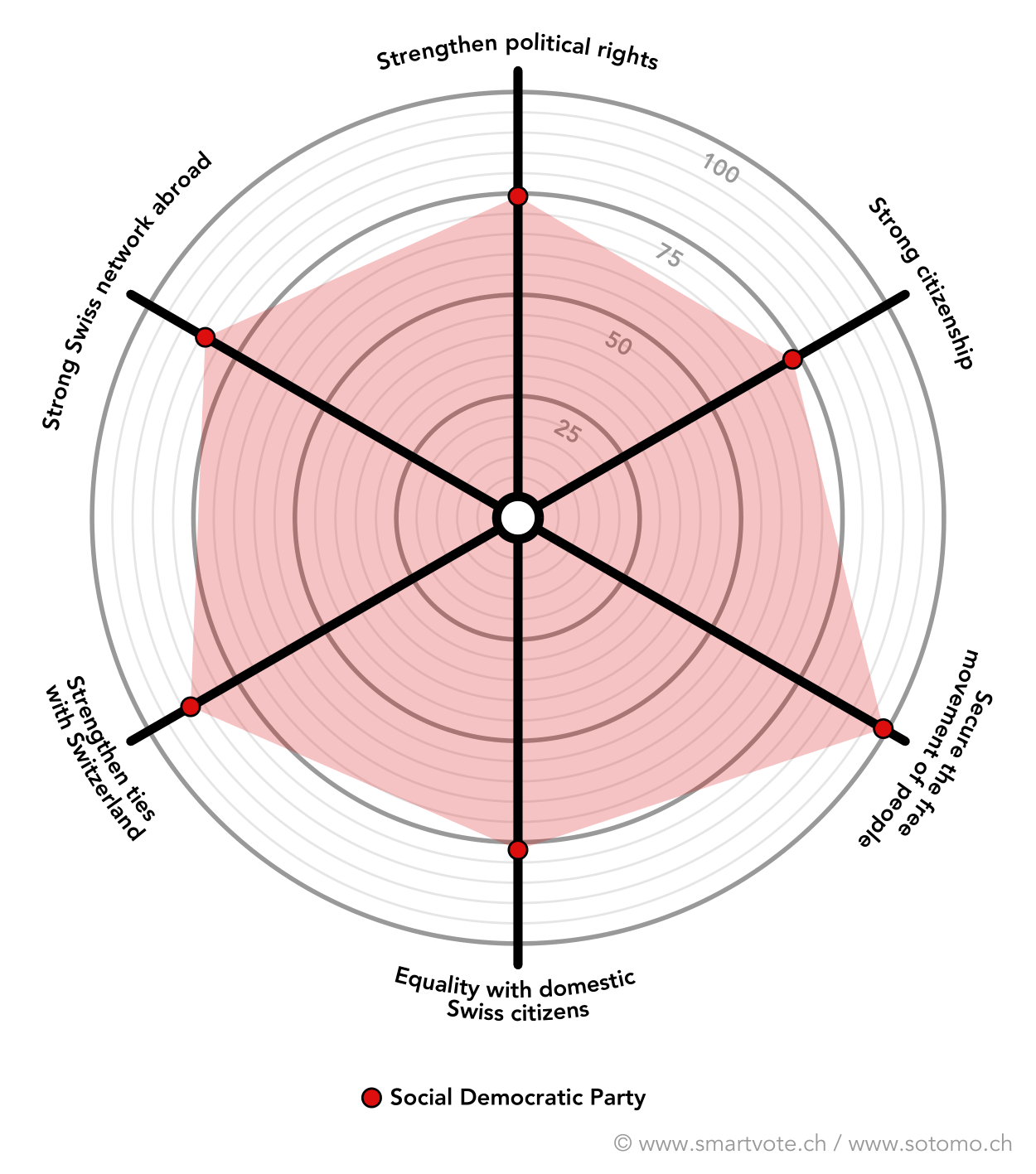Social Democrats International: connected for 24 years

The international section of Switzerland’s Social Democratic Party has branches in the US, France, Israel and Africa. Two Swiss Abroad explain why its members are concerned about banking problems, and why the issue is a social-democratic one.
The left-wing Social Democratic Party has had an international section since 1999. The founding initiative was launched by ambassador François Nordmann, who with Tim Guldimann was “one of the first Social Democrat members in the embassy service”, as the party office describes it.
Guldimann was the very first Swiss Abroad to sit in the House of Representatives. He was elected in canton Zurich but remained resident in Berlin. He resigned during the four-year legislative period in 2018, explaining that he was unable to fulfil the political demands that his position required.
- Swiss Social Democratic Party
- Founding year: 1888
- Presidency: jointly shared by Cédric Wermuth and Mattea Meyer
- Federal Council (government) posts: 2, Alain Berset (since 2012) and Elisabeth Baume-Schneider (since 2023)
- Membership: 31,300 (as of 2019)
- Vote share 2019: 16.8%
- Proportion of seats in the Federal Assembly: 18.3%
- 39 seats in the House of Representatives (19.5%)
- 6 seats in the Senate (13%)
- Proportion of women in the House of Representatives: 64.1%
- Proportion of women in the Senate: 33.3%
- Political position – three core issues:
- more purchasing power and prosperity for all.
- greater equality and equal opportunities.
- strengthening public services. (SRF)
The party’s international section is made up of 155 members spread across four continents. This reinforces ties to Switzerland and Swiss politics, says Denise Dafflon, executive committee member and coordinator of the Social Democrat “antenna” in the US. “The core focus is the political rights, activities and interests of Swiss citizens abroad .”
The branches abroad, the so-called “antenna”, are a peculiarity of the Social Democrats: they form the organisational framework for members of Social Democrats InternationalExternal link, whether they be in Berlin, Brussels, Rome, Tel Aviv or the US. Alongside their political engagement, they also try to mobilise the Swiss Abroad for referendums and elections. “This view from outside looking in is very important for Switzerland,” Dafflon explains.
Main objectives
The ability of the Swiss Abroad to exercise their political rights in Switzerland is a central issue for Social Democrats International. “We’re very active about bringing about simplified, unbureaucratic processes,” says Moritz Bondeli, a Social Democrat member and PhD candidate at Yale in the US.
Dafflon adds: “We’re not used to the fact that as Swiss we have to actively make sure that we can vote and elect.” But that’s actually what emigration means – having to register with the embassy. Dafflon is convinced that these rules have to change. “The Swiss Abroad should have to explicitly renounce their rights if they don’t want to make use of them.”
She adds: “European mobility for the Swiss, the institutional agreement between Switzerland and the EU, as well as all the questions about researching and studying abroad are important topics for us.”
E-voting solution
“It’s crucial that those Swiss Abroad who want to take part in elections and referendums can do so,” Dafflon says. For Social Democrats International, e-voting is, in the long term, an important instrument to guarantee political participation. “But it has to be safe,” Bondeli says. “Only after that should e-voting be rolled out. The pilot project in June was encouraging.”
Other voices, in particular the Social Democrats International antenna in the US, want an interim solution until a reliable system is found. In this case, both Social Democrat members point to using diplomatic courier services. The federal government has already examined sending the voting paperwork by diplomatic post. “What we’d like is that the documents can also be sent back via the embassies and consulates,” Bondeli says.
In a lot of cases, sending everything back via normal post isn’t even possible, and using an international commercial courier service is then too expensive. The result is that many of the Swiss Abroad don’t even bother to vote because, Bondeli believes, “they doubt whether their vote will even get counted”.

‘Bigger fish to fry’
For the elections this year the Social Democrats have decided against a Swiss Abroad list. “Our party doesn’t really distinguish between the Swiss here at home and the Swiss Abroad,” Dafflon explains. Instead there’s an implicit trust that the candidates in Switzerland have listened to and understand the problems of the Swiss Abroad.
This is also why, at the moment, direct parliamentary representation of the Swiss Abroad is a lower priority. “Right now, we’ve got bigger fish to fry,” says Bondeli. The main thing for the Social Democrats is that all of the Swiss Abroad who want to vote can actually do so.
Nonetheless, the Social Democrats do have a Swiss-Abroad candidate in the coming elections: Pascal Cuttat from Nairobi, on the list for canton Bern. Social Democrats I nternational are supporting his candidacy with everything they’ve got, the international section says. A direct representative is not necessarily a priority, but it would be a good step in the right direction.
Access to a bank account
“The Swiss Abroad must have the opportunity to access basic finance services like a bank account or a mortgage,” Bondeli believes, and “at acceptable conditions”. Switzerland, with its globally operating banks, like UBS, who have all the necessary know-how, tends to provide only for those who bring enough capital with them, she says. “Millionaires really don’t have a problem to bank here from abroad.”
The result is a social imbalance, which is why the Social Democrats see access to a bank account as politically relevant.
The upshot is that Social Democrats International sees the ability of the Swiss Abroad – whatever their means – to have banking services as an essential public service. Moreover, it views this as the duty of the banks in upholding their part of a mutual solidarity.
“Public Swiss sovereignty has been invoked time and again when the banks have been endangered,” Bondeli points out.
Nevertheless, Dafflon says, how banks treat their customers doesn’t only have an impact on the Swiss Abroad. “ Bank account fees should anyway be charged proportionately according to income and assets,” she says.
+ The Social Democratic Party won the Tax Relief Act on withholding tax and stamp duty, defeating a solid centrist block, including the Liberal Green Party and commercial interests.
+ The party has profiled itself further as a strong advocate of women’s rights – no other Swiss party has more women members.
+ The Social Democrats won a widening of the anti-racism laws to include better legal protection for gays, lesbians and bisexuals, with the initiative coming from the Social Democratic Party. (SRF)
– The Social Democrats suffered a bitter defeat with their “More Affordable Homes” initiative on behalf of people who rent.
– With the referendum on reforming old-age and survivor insurance, the party lost on what is one of its core policy goals.
– During the legislature, the party lost three seats in the Senate (Ticino, St Gallen, Fribourg) leaving it with only six seats – a low-point they last experienced in 1999. (SRF)
Election issues and goals
More money for middle-income earners: With its “Payment-relief” and “Daycare” initiatives, the party wants to funnel more money back into the purses of middle-class families.
Rents: The Social Democratic Party has a close eye on exploding rent prices and, correspondingly, the general housing crisis. The party is currently considering a number of tactics, including calling a referendum on the issue.
Climate measures: Together with the Greens, the Social Democrats have launched an initiative for a climate fund to promote ecological renewal and alternative energies.
Equality: The Social Democratic Party is the party of equal opportunities. Its platform is to continue fighting for equal pay and equal pensions for everyone, which is one of the reasons that it has called for a referendum against the planned reform of the second pension pillar. (SRF)
Starting position and prognosis
With 16.8% of the vote at the last elections, the Social Democrats reached a historic low point. Until now, the party has even faced the prospect of being overtaken by the Radical-Liberal Party as the second-strongest parliamentary force.
At the beginning of the current legislative period, it lost voters in numerous cantonal elections. In the meantime the party has managed to improve its performance, and in the key elections in Zurich it managed, for the first time recently, to slightly increase its vote.
The political forecasts are that the Social Democrats will stay where they are, or make only slight gains. If so, then the discussions about the party’s claim to a second seat in government may well fizzle out. The party’s goal is to remain, after the Swiss People’s Party, the second-strongest party.
The headache for the party is the Senate. After taking 12 seats in the 2015 elections – a historic record – they now have only six, following recent losses in Ticino and St Gallen.
The last time the Social Democrats were so poorly represented in the Senate was almost 25 years ago, in 1999. Nonetheless, the party could increase its presence in the House of Representatives, perhaps at the expense of the Greens. (Iwan Santoro, SRF)
Edited by Marc Leutenegger. Translated from German by Thomas Skelton-Robinson

In compliance with the JTI standards
More: SWI swissinfo.ch certified by the Journalism Trust Initiative













You can find an overview of ongoing debates with our journalists here . Please join us!
If you want to start a conversation about a topic raised in this article or want to report factual errors, email us at english@swissinfo.ch.